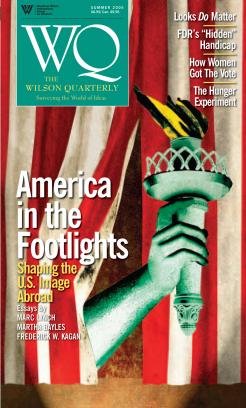America in the Footlights


Historians continue to debate whether it was necessary to drop the bomb on Japan.
Understanding religion's role in America's present depends on examining its role in the past.
Liberal thinkers once championed freedom. It may be time for them to reclaim that agenda.
Why political shoutfests turn voters off.
Unraveling North Korea's nuclear gamesmanship is a dangerous but vital task for diplomats.
The United States has tried imposing democracy in other countries, long before the Iraq War was launched.
Today's business schools are packed with professors with little or no management experience, ill-equipped to turn out future business leaders.
A novel idea for cutting the trade deficit: have the federal government use 21st-century accounting measurements.
Job statistics among blacks remain bleak. One contributing factor: the steady increase in incarceration rates.
Throughout American history--including today--blacks have not agreed on how to name their own group.
The strange role sensationalism has played in shaping social mores.
The inventor of soap opera, Irna Phillips, lived a life worthy of her famous creations.
Today's teenagers know little about the Bible, and have a correspondingly diminished understanding of American history.
It's impossible to understand America's founding without John Locke's philosophy of individual natural rights.
It's no mystery why hitting major league pitching is so difficult; science reveals that the spin of the ball determines its trajectory.
The insect world has its own police; the "criminals" are rogue females introducing their own eggs into the population.
Many therapists now regard their profession as more of a philosophy than a science--and that is having a positive effect on their patients.
Frustrated by their failure to match genes to specific purposes, many scientists are beginning to look to a new field: systems biology.
Considering the legacy of the late American novelist, Saul Bellow.
Trying to find the real Walt Whitman in the varied anthologies of his work.
Classical art, so prevalent in early American motifs, did not point to revolutionary ideology, but, says a Stanford historian, "was reinvented to suit the ends of a new political program."
Appreciating the poet E. E. Cummings, whose typographically experimental work exists almost entirely on the printed page and is rarely recited.
A new set of history textbooks endorsed by Japan's Ministiry of Education has created a storm of controversy over the country's view of its wartime past.
The Dutch seem to have pulled off a miraculous solution to the conundrum of the aging welfare state.
On the short list of states that still cling to communism, one country is often overlooked: Laos.
David Lindley on a Darwin predecessor, William Paley
Jeffrey Meyers on a new illustrated catalog of the work of Toulouse-Lautrec
Michael Kazin on democracy and populism
SONGS FROM THE
BLACK CHAIR:
A Memoir of Mental Illness.
By Charles Barber. Univ. of Nebraska Press. 202 pp. $22
SPECIAL EFFECTS:
An Oral History.
By Pascal Pinteau. Translated from French by Laurel Hirsch. Abrams.
566 pp. $37.50
MAGAZINES THAT ...
THREE BILLION NEW CAPITALISTS: ...
PERFECT SOLDIERS: ...
THE XENO CHRONICLES: ...
LAND OF GHOSTS: ...
FIVE DAYS IN PHILADELPHIA: ...
LANE KIRKLAND: ...
TO DIE IN CUBA: ...
BECOMING JUSTICE...
In the pleasant haze of half-remembered history, the ratification of the Nineteenth Amendment is surrounded by images of determined suffragist on the march over the protests of buffoonish men. The reality was a lot more interesting than that.
The Arab satellite television station al-Jazeera has become a notorious outlet for terrorist images, but less well known is its role as a forum for democratic reform in the Arab world.
The United States government once employed a great deal of time, effort, and money to promote its image abroad. That—and more—may be necessary in the world of today.
The complicated history of power and persuasion.
Americans so idolize the thin and the beautiful that it’s become something of a national embarrassment. What’s even more embarrassing is how bad most Americans actually look. There are good reasons why they should fret more, rather than less, about appearances.
In the decades since Franklin Roosevelt’s presidency, Americans have come to believe that FDR hid from the public the crippling effects of his polio. That myth about the man in the wheelchair says more about our own time than it does about his.